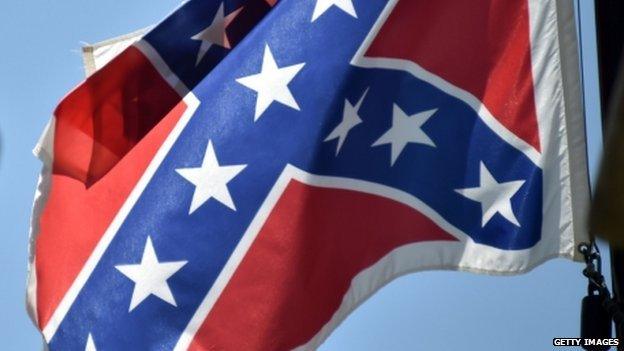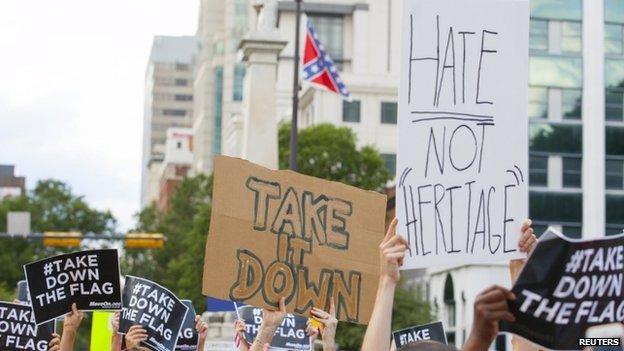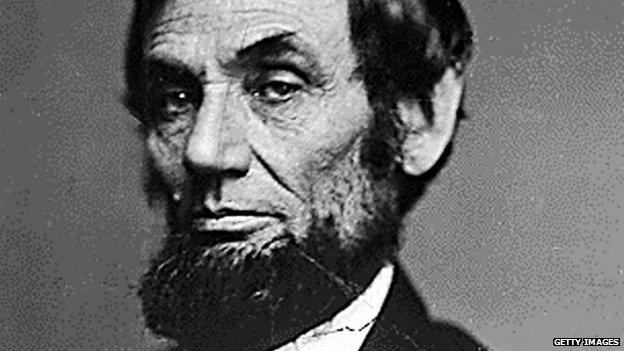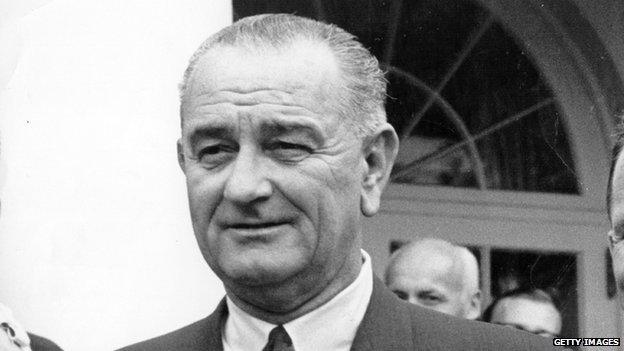Confederate flag: Why it is so potent in the US
- Published

The whole family was astounded by what we found in Tuskegee.
The town in Alabama is important in American history for several reasons: the university, external founded by Booker T Washington is there, so was the all-black air force squadron, external and it was the site of an awful medical experiment, external on black men.
So we thought it was worth a stop on our holiday through the Deep South.
There, bang in the centre of this town with a 95% black population was a memorial to the Confederate war dead, the men who fought to keep black people as property.
It is the crux of a current debate. What is an affront to some is, for others, a mere matter of pride in their past. Or so they say. The trouble is the past is not neutral territory.
For decades, rows have erupted every once in a while over Confederate symbols.

Protestors want the flag at the South Carolina State House taken down
Most potent is the Confederate flag.
Now, after the Charleston killings, by a man who celebrated that flag and denigrated the Stars and Stripes, external, it could be a big issue in the 2016 US presidential elections.
To some, the Civil War battle flag of the breakaway Southern states is as tainted as the swastika, external and allowing it to fly over the State House in South Carolina, where one-third of the population is black, is akin to hoisting the Hakenkreuz in Jerusalem.
As I wrote last autumn, to others, it is as innocent as the St George cross - occasionally waved by racists but not their exclusive property.
Rejection of the past
This could be the Republican Party's Clause Four moment - a deliberate rejection of the past - akin to the UK's Labour Party, in 1995, dropping its commitment to the state ownership of industry.
The shunning of the Confederate battle flag might be as potent a symbol as the flag itself.
The Republican Governor of South Carolina, Nikki Haley - whose parents, incidentally, are originally from India - has changed her mind and now says it should go, external, as a "deeply offensive symbol of a brutally offensive past".

Republican presidential candidate Jeb Bush is against flying the Confederate flag
Mitt Romney, the Republican candidate in 2012, tweeted last weekend: "Take down the #ConfederateFlag at the SC Capitol. To many, it is a symbol of racial hatred. Remove it now to honor #Charleston victims."
He ignited a debate, external.
The Republican frontrunner for 2016, former Florida Governor Jeb Bush, external, said: "In Florida, we acted, moving the flag from the state grounds to a museum, where it belonged."
Rick Perry has tweeted removing the flag would be an act of "healing and unity". , external
But fellow Republican presidential candidates Ted Cruz, external, Marco Rubio, external and Scott Walker, external, who is thought likely to run, have suggested it is up to South Carolina.

Ted Cruz, another candidate for the Republican nomination, says the debate about flying the flag is complex
Long-term problem
This is really important because it plays into the Republican Party's big, long-term, political problem.
Despite recent successes, its vote is predominantly white, rural, and elderly.
The growing force in US politics is the Hispanic vote - that minority has become the largest single ethnic group in California, external and soon will be in Texas too.

Under Lincoln, the Republican Party campaigned to end slavery
Some Republicans worry the harsh tone of their debate over illegal immigration from Central and South America has poisoned their image with people whose family come from that part of the world.
I have long thought it would be a pivotal moment when - or if - a Republican candidate found the right language - and politics - to challenge this perception.
But the fury about the Confederate flag provides them with another opportunity to, as Americans put it, "reach out" beyond their core vote.
Only 6% of black Americans voted Republican in 2012.
You could just assume it is not surprising that a conservative party does not appeal to a group statistically less well off, external than other Americans.
But that is very far from the truth, and alien to the party's origins.
The US parties have only recently moulded themselves into the left-right divide familiar to the UK.
The Republican party, the party of Abraham Lincoln, the victor of the Civil War, the Grand Old Party, was the party that campaigned against slavery, and fought a war that liberated black Americans.

The Democrats abandoned their two-track approach under Lyndon Johnson
Their decision to shed that heritage was strategic and deliberate.
American politics underwent a stunning convulsion, an earthquake in the wake of the tsunami of civil rights, external.
The Democrats under Lyndon Johnson in the mid-1960s abandoned their traditional and uncomfortable split, external between northern liberals and trade unionists on the one hand and highly conservative Southern racial supremacists on the other.
The Dixiecrats, external had ruled the South like a one-party state, and with about as much toleration of black dissent as any dictatorship.
The Republicans deliberately pursued what was known as "the Southern strategy", external to pick up disgruntled white voters in the South with a harder racial politics.
Morally questionable, it was strategically stunningly successful.
The South is now overwhelmingly Republican, external - but this now feels like winning a race by speeding down a cul-de-sac.
This is, of course, is not only about one party's fortunes but also a deep wound that still divides a nation.
The trouble is many white Americans believe that the scars are fading, while many black Americans feel the injury is turning septic.

The Dixiecrats and the 1948 election:
Formed as the States' Rights Democratic Party as a reaction to the liberal policies - particularly on civil rights - of new Democratic President Harry Truman
Put up its own nominee at the election - the Governor of South Carolina, Strom Thurmond
At a convention in Oklahoma City, it adopted a party platform that stated: "We stand for the segregation of the races and the racial integrity of each race"
Thurmond carried the previously solid Democratic states of Alabama, Louisiana, Mississippi and South Carolina. However, it did not stop Truman winning the presidency

The problem is a different view of history.
To some, slavery was a very long time ago, civil rights battles were won a generation ago and equality is the law and the norm.
As I've heard people put it: "They should get over it."
This complacent view ignores what actually happened after the Civil War.
Reconstruction, external, as the period is known, saw hundreds of black politicians elected and black Americans appointed as lawmen, and the growth of black businesses.
These modest baby steps towards equality were smashed.
The Ku Klux Klan was set up deliberately to destroy this progress.
It is no accident that "uppity" is the adjective attached to the familiar insulting description of black people - the violent politics of the time was about keeping a people down, destroying aspirations, keeping them from rising to the economic and political levels of even the poorest whites.

Remembering the Confederate war dead in Tuskegee
And the Confederate flag was their flag.
It was made part of Mississippi's state flag only in 1894 - some 30 years after the Civil War, but a couple of years after Congress made it easier to disenfranchise black people, external.
Georgia got rid of the Confederate flag from its state flag in 2001. But it was not there as some deep historical hangover - it was put there only in 1956, as the arguments about civil rights raged.
The Confederate flag can be seen as a symbol of the tattered dignity of a proud people who lost a war.
But undeniably it has also been the rallying banner of an active and successful resistance to racial equality, a celebration of the renaissance of white power, a symbol that the struggle did not end in 1865.
The most subtle observer of the South, novelist William Faulkner, wrote: "The past is never dead. It's not even past."
But it might be less present if Republicans adopt a new strategy for a New South.